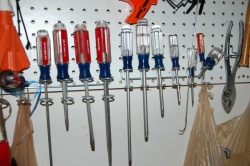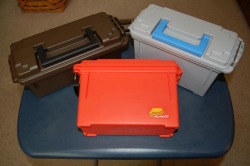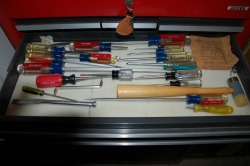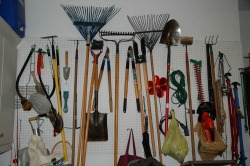
Survival tools is a very large and varied subject to tackle. One man’s wrench is another man’s pair of pliers. It’s also hard to focus on just one classification of tools. For this treatise we are talking about tools to build things, fix things, and maintain things.
For purposes of survival discussions solely this go around, we are not talking about firearms, knives, and such. Tools of course is a rather generic term for a whole host of items also called instruments, utensils, implements, and such usually implied to be handheld. Tools can also be machines, which is also beyond the scope of most average preppers. Tools defined are devices or aids for performing, doing, or facilitating work.
In the simplest sense then, if you wanted to sweep the dirt off the front porch or out of the garage, then you might select a tool such as a broom to carry out the task. Of course, there are numerous kinds of brooms, but then there are also tools such as electric or gasoline air blowers to get the job done. You can see perhaps the tangents that could be taken in what might seem like a most basic discussion of something like tools. Nothing is so simple or concise it seems any longer.
Tool Caches

For survival purposes we know that during a SHTF or any form of a disaster, we generally have two choices of action. We either Bug In or we Bug Out. Bugging in usually means we just stay home where we live. That could mean a simple family dwelling or an apartment or condo or a house trailer in a park.
Whatever your living circumstances, it could be assumed that more space is available at a Bug In location for storing tools than say a Bug Out the door situation in which you only grab your pre-planned and pre-packed Bug Out Bag. Likely in that situation you are not going to have a huge selection of tools, if many at all. But you should plan for some even if it is just one extra tool bag.
If you happen to already have an established alternative living shelter as a Bug Out site, then perhaps it can be fairly well equipped, too with ample tools to tackle most common jobs you might confront.
So, the point here is to plan for a selection of tools for your primary residence, another set as a grab bag, and perhaps a third collection of tools at a Bug Out site. Wherever you go, or stay, or in the process of travel, you are going to need some basic tools. Plan for this now.
Mechanics Tools
For sure you may not be an auto mechanic or even good at fixing things, but you can learn. Everything mechanical will eventually need maintenance of some kind. It may be as simple as replacing a light fixture, wall switch, a door lock, a house shutter or such. It may be more detailed or complicated like changing a spark plug in the lawn mower, changing out parts on anything mechanical, replacing a kitchen disposal, or any like work project at home.
Fixing anything requires a basic tool set. Honestly, you can purchase a fairly good complete tool set at a lot of places geared toward the homeowner or DIY fixer upper. This basic set should include a hammer, pliers, several types of screwdrivers, an adjustable wrench, adjustable jaw pliers, vise grips, needle nose pliers, side cutters, box and open end wrenches, a socket set, and an Allen wrench set at the very least. Many other mechanic tools can be added.
Plumbing Tools
You may chuckle at this mention as qualifying as fitting into a survival scenario, but trust me if your plumbing is failing, it becomes a survival issue. If water flows in your house or bug out shelter, eventually you will be in the plumbing business. Besides the basic tools listed above, there are specialty plumbing tools to gather. This should include a quality plunger for toilet jams. Then there is the “snake” used for clogs into any piping system.
Cruise the plumbing aisle at a well-stocked hardware store and you will see other tools for plumbing. There are special plumbing pipe wrenches, a basin wrench, slip joint pliers and sink piping wrenches to help facilitate repairs. Though not tools, also have a selection of common plumbing parts, washers, flush valves, tank seals, some PVC pipe in different sizes, connectors, PVC cleaner and pipe adhesive.
Construction Tools

Even if you are not the building project type, there will be times that repairs are needed. This means a selection of hammers, a level, hand wood saws, coping saws, drywall saws, tape measures, a square, angle cutting fixture for trim work, carpenter’s pencil, chalk markers, and other general construction tools. Again, walking the aisles at a home improvement store offer a huge selection of tools to choose.
Heavy Tools
This is a classification I just made up. It includes a sledge hammer, a long handled ax, a double head ax, a long, heavy pry bar, crowbar, long handled limb cutter-trimmer, heavy tree saws, hatchets, hand maul hammer, and such.
Other items that fit nowhere else include a plastic chemical tank sprayer. Also add a couple tire inflation hand pumps most call a bicycle tire pump. These really come in handy to keep tires inflated to the right pressure.
Maybe not thought of as tools, but you better have several ladders of different types to reach things. Short step ladders, tall step ladders, and an extension ladder for sure.
Garden Tools

You may not be cultivating a full sized garden, but even so, you might want to consider planting a few things close to the house in flower beds. Many vegetables can be grown easily in a small patch of ground. You’ll need some basic outdoor yard and garden tools including shovels, hoes, and rakes for gardening. Hand gardening tools like trowels, little shovels, and hand rakes are helpful, too.
Check Out: Pandemic is an Inevitability
If you need to trim bushes for security so you can see out or make it look like somebody is home, you’ll want some hand brush cutters, loppers, and some smaller, shorter fold up hand saws.
Other outdoor tools that might be useful would be set of post hole diggers. These have many uses from planting large plants or trees to digging post holes to build or repair a fence or to build other outdoor structures or projects.
Undoubtedly there are other classifications or categories of survival tools not covered here. This is only take on the subject. You may have more. This is your chance for input. We’d love to hear what other tools or items you could add to this selection. The one thing we are quite sure of and that is the need for lots of tools is essential and indeed critical to your survival efforts in the long haul.

1 comment
your house (or BOL) is too small,
You don’t have “too many” tools. EVER!
you may own a few tools that you can say are “throw-aways” if they would impede your escape in a “bugout” situation, but you will still on occasion, regret leaving them behind.